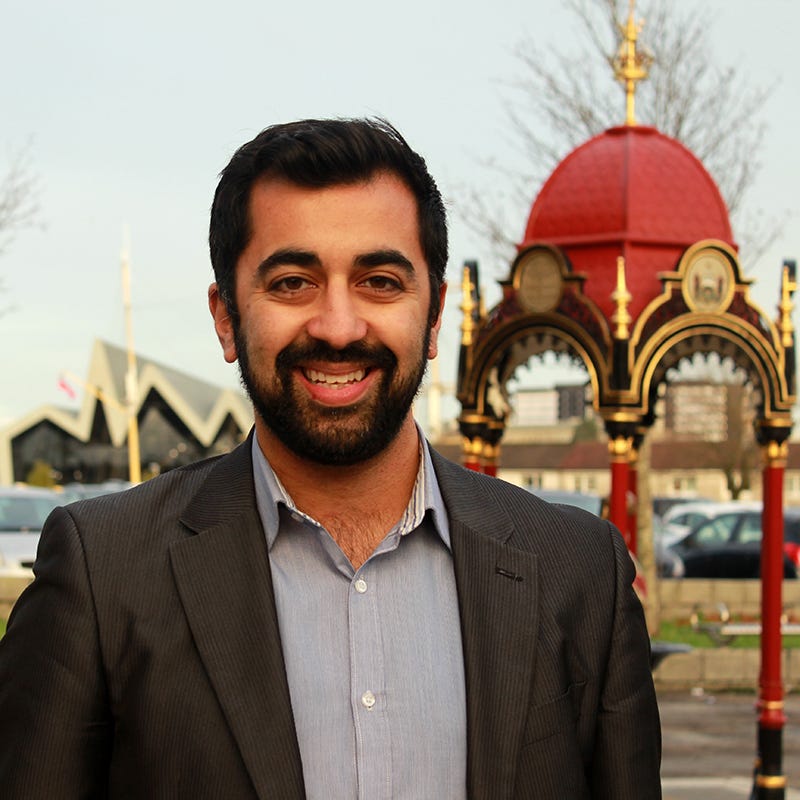The Anti-White March Through British Institutions
The past decade has witnessed a significant rise in anti-white sentiment across Western countries. Research shows that white individuals— those of European and Hispanic descent, and often Middle Eastern, and North African descent—constitute 70% of the U.S. population, 69% of Canada's population, and 81% of England's population. Given these statistics, it appears illogical for the demographic majority in these nations to face such discrimination. This article is the first part in a series where we explore such issues. -Atlantic Playbook.
When Scotland’s recently resigned First Minister Humza Yousaf delivered a speech in 2020 lamenting the high number of white people in positions of power, there was a chance it could one day come back to bite him. That day arrived on April 1 when Scotland’s Hate Crime and Public Order (Scotland) Act became law. April 1 is an apt date for its introduction, and the comedy of it was not lost on the Scottish public, thousands of whom called Police Scotland with “hate” complaints related to Yousaf’s anti-white tirade.
Humza Yousaf is the son of Pakistani immigrants who migrated to Glasgow in the 1960s. Mr. Yousaf has repeatedly asserted that he experienced racism throughout much of his life, and while this may contain truth, it does not validate the obvious disdain for white people expressed in his infamous speech. Addressing his peers, Yousaf identified numerous senior positions across the Scottish legal and political establishment and succeeded them with the word “white.” That word did not appear intended as a term of affection or endearment.
Interestingly, a Reuters “fact check” determined that Yousaf had not complained about the number of white people in powerful posts, but the lack of non-white people. There is, of course, no distinction, and it is worth remembering that Scotland is 94% white, and therefore, worth questioning why non-whites should be expected to hold a significant number of influential public roles.
Nevertheless, fast-forward to April 1, 2024, and the Scottish public reported their own First Minister to the police for potential breaches of the law he devised and prodded through Parliament as Justice Minister. As expected, Police Scotland was uninterested and said not only that the law was not retrospective, but that Mr. Yousaf’s remarks did not rise to the level of a crime.
If the First Minister’s words did not reach the threshold required to trigger a prosecution, it is worth speculating as to what would. One would assume that if a white politician stood in Parliament complaining that there were too many non-whites in power, that threshold would almost inevitably have been met.
It is impossible to predict with certainty how the new law will be applied, but we can scrutinize past examples of what Police Scotland has considered serious enough to warrant arrests. In 2022, before the hate crime laws were implemented, a preacher in Glasgow was arrested for reading the Bible on a public street. Although he was not charged, the example remains pertinent.
South of the border in England, where the Scottish legislation does not apply, people are frequently arrested for expressing non “woke” sentiments, particularly regarding race. A man from Merseyside, for instance, in northwest England, received a five-year jail term for “creating a white supremacist website.” Ryan Ferguson, also from Merseyside, was jailed for nine months for shouting racist slogans at a soccer match. There are copious examples of “hate crime” legal cases, but what they all have in common is a white suspect or defendant.
The UK actively disadvantages white people, and not only within the criminal justice system, but notably also in the jobs market. Last year, Glasgow City Council advertised an employment opportunity for non-whites only. Such adverts are so common that employment agencies often have separate website sections dedicated to non-white job offerings. This is despite the UK-wide Equality Act, which prohibits discrimination on the basis of race. Any race. In practice, of course, the Equality Act protects only non-white people, and the reason is easy to pin down.
The British public sector, including the police, court system, and civil service, is dominated by left-wing ideologues who pursue their political agenda disguised in virtuous phrases such as “equality and “justice.” No political figure in the UK will oppose anti-whiteness, because they know they would face an onslaught from left-wing media outlets if they did. Politicians are not alone in playing this craven game, however. Despite police persecution of the faithful, Christian churches, most notably the Church of England, lead the charge in promoting anti-white sentiment.
In March, Archdeacon Miranda Threlfall-Holmes attended a conference about anti-whiteness and later posted on X that it had taught her the unbreakable link between white people and oppression. She subsequently called for the abolition of whiteness (whatever that means). Similarly, officials from the diocese of Birmingham advertised a vacancy for an "anti-racism" officer, whose role was not to promote race equality, but to "deconstruct whiteness."
Communist activist Rudi Dutschke coined the phrase “the long march through the institutions” in 1967 to pronounce how the revolutionary left could secure social control without the inconvenience of acquiring it at ballot box. In the UK, that process is complete. All sectors of public life march to the same anti-white and anti-Western drum.
When the Scottish people reported Humza Yousaf to the police for potentially breaking his own laws, the left-wing Guardian newspaper predictably and matter-of-factly declared that “neo-Nazis” had hijacked the legislation for their own nefarious ends. In Britain, if one does not agree to march to the totalitarian drum, they can expect to be affixed with analogous labels. Given the consequences of these labels, and the desperation to avoid them, millions of Britons seem willing to march in any direction instructed.




